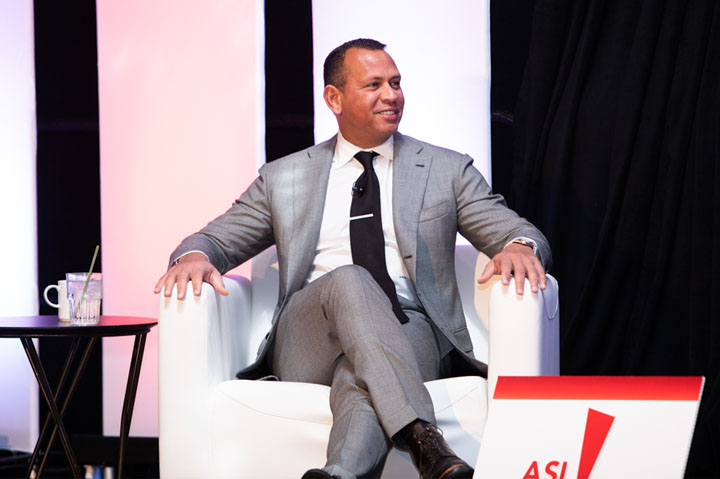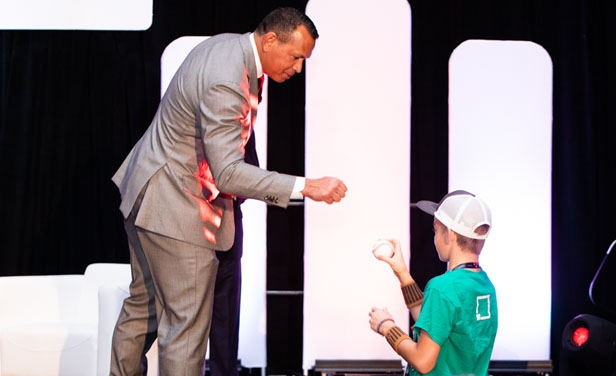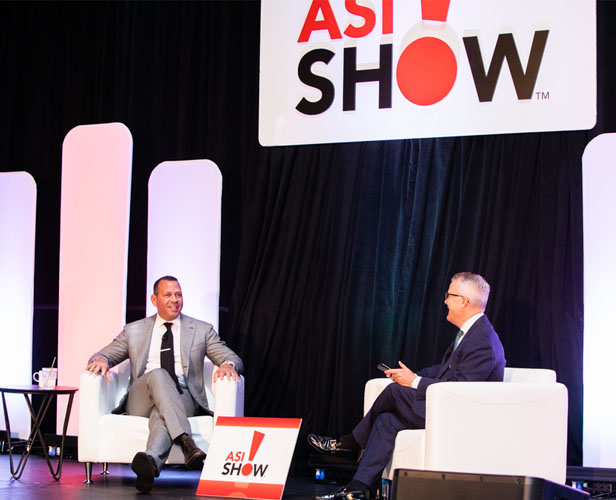January 09, 2023
ASI Orlando 2023: A-Rod Hits Grand Slam With Keynote
The baseball great joined ASI President & CEO Tim Andrews to talk about his formative years, experiences in baseball and lessons learned in business.
“All I ever wanted was to play baseball and run a business.”
Based on those parameters, Alex Rodriguez, known as “A-Rod” by millions, is a smashing success.

Former baseball great Alex Rodriguez, now the head of A-Rod Corp., shared stories of his upbringing and business lessons during his keynote address at ASI Orlando.
After distributing signed baseballs to three lucky keynote attendees, Rodriguez joined ASI President & CEO Tim Andrews on stage at ASI Show Orlando to talk about his modest childhood, being raised by an industrious single mother, his path to professional sports and spearheading A-Rod Corp., a business with a robust $1 billion portfolio that includes real estate, venture capital, investments and brand partnerships.
In addition to being a 14-time MLB All-Star and winning the 2009 World Series as a New York Yankee, Rodriguez is also an Emmy award-winning MLB analyst for Fox Sports and ESPN.
But for this superstar, his path to success wasn’t always clear and certain. He was born in New York City, nearly in the shadow of the old Yankees Stadium. His father owned a renowned women’s shoe store, and Rodriguez fondly recalled spending evenings with his dad watching Yankees and Mets games on TV. When the family needed a change, they relocated to the Dominican Republic, then to Miami. That was where Rodriguez started playing baseball.
“I could play all year round because of the weather,” he told the 400 attendees, “and I was with other kids who had the same passion for the sport.”

Rodriguez gives a signed baseball to an enthusiastic attendee.
At 10, his father left and returned to New York, leaving Rodriguez’s mother to provide for the family single-handedly by working multiple jobs. When not going to school, playing baseball or spending time at the Boys and Girls Club, Rodriguez dreamed about professional sports and becoming an entrepreneur – mainly to eventually provide for his hardworking mom.
“I always had that hunger to do well,” he said, “to make something of my life so my mother could retire and never have to work again.”
Although his high school, Westminster Christian, was small, it was a baseball powerhouse – Rodriguez received scholarships to play baseball and football for the University of Miami, but as the country’s top baseball prospect he opted to join the Seattle Mariners in 1994 with a signing bonus of more than $1 million. With the money, Rodriguez bought his mom a house and a car – “she never worked again,” he said. “I remember the pressure I saw on her to pay the rent when we were growing up. Any pressure I ever felt in professional sports was very small in comparison.”
That decision to forego college and go pro marked the beginning of more than 22 years in the major leagues, including a World Series win with the New York Yankees in 2009. After retiring in 2016, he became a media contributor, guest judge on Shark Tank and founder of A-Rod Corp., which now has more than 400 employees.
Rodriguez stressed that all business owners, at both large and small enterprises, need to have a vision for what they want their company to be and where it’s headed. “What do you want to be at the end of five years?” he said. “If a goal requires capital, do you invest or raise it? How do you crystalize the vision?”
For Rodriguez, it was critical that he figure out how to invest – not just to run his company well, but to manage the money he brought in as a baseball player. Professional athletes make the vast majority of their money before they’re 30, he said, and they don’t think about what happens beyond that, when the money stops.

Rodriguez discusses financial and personnel management with ASI CEO & President Tim Andrews.
“Your earning power goes down, so your investments have to go up,” he said. “You have to look at assets that appreciate in value. You have to be really smart, and so many athletes have financial challenges.”
Rodriguez has also had to learn how to manage personnel, including identifying and retaining talent, and making changes when necessary. It was a hard-won lesson; after his father left the family, Rodriguez spent years seeking out and looking up to powerful men. That led him down some wrong paths, he said.
“Look at the attitude and energy of the people around you,” he said. “Do the lights brighten or dim when they walk into the room? Can they be trusted? You can’t overpay your best talent. But I believe in hiring slow and firing fast. Tell people you’re going to be radically honest with them and they’ll appreciate that. Your network reflects your net worth.”
In general, look for talent, diversity and integrity among the people you choose to surround yourself with. “Hire people who are smarter than you, who can take you to the next level,” he said. “Who’s your right-hand person, your left-hand person? Who’s in your core group? Find talented people with the same moral code as you, who bring trust and transparency, but who are also different from you and aren’t afraid to call out your blind spots.”
The same applies to prospects and clients – Rodriguez told the crowd he’d prefer slimmer margins with someone he can trust, who’s aligned with his values, thinking and growth vision, than wider margins with a client who keeps him up at night and can’t be trusted.
“Once you get the meeting, work your magic,” he said. “People do business with you because they like you and they trust you. End of story.”
